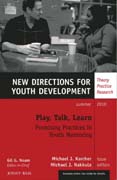
Play, talk, learn: promising practices in youth mentoring
Karcher, Michael J.
Nakkula, Michael J.
INDICE: "Issue Editors' Notes (Michael J. Karcher, Michael J. Nakkula). Executive Summary. 1. Youth mentoring with a balanced focus, shared purpose, and collaborative interactions (Michael J. Karcher, Michael J. Nakkula) This article presents the framework for understanding the nature of mentoring interactions that helps organize the other articles in this volume in terms of their analysis of interaction focus, purpose, and authorship. 2. Mutual but unequal: Mentoring as a hybrid of familiar relationship roles (Thomas E. Keller, Julia M.Pryce) This article presents evidence favoring a hybrid model of relationships for successful school-based mentoring interactions. 3. ""I dunno, what do you wanna do?"": Testing a framework to guide mentor training and activity selection (Michael J. Karcher, Carla Herrera, Keoki Hansen) This article tests hypotheses regarding the distinction between relational and goal-directed interactions and the importance of collaborative activity negotiations between mentorsand mentees. 4. Beyond the dichotomy of work and fun: Measuring the thorough interrelatedness of structure and quality in youth mentoring relationships (Michael J. Nakkula, John T. Harris) This article presents and discusses associations between match structure (guiding purposes and activity focus) and ratingsof mentoring relationship quality. 5. GirlPOWER! Strengthening mentoring relationships through a structured, gender-specific program (Julia M. Pryce, NaidaSilverthorn, Bernadette Sanchez, David L. DuBois) This article describes a structured approach to supporting girls through the Big Brothers Big Sisters program that balances focus, purpose, and authorship. 6. Deconstructing serendipity: Focus, purpose, and authorship in lunch buddy mentoring (Timothy A. Cavell, Joye L. Henrie) This article describes the particulars of lunch buddy mentoring and the reasons that it might be an effective form of youth mentoring. 7. The structure of effective academic mentoring in late adolescence (Simon Larose, Diane Cyrenne, Odette Garceau, Pascale Brodeur, George M. Tarabulsy) This article explores the structure of the academic mentoring relationship in late adolescence through analysis of its varied experiences and mentor behaviors. 8.Building mentoring relationships (Stephen F. Hamilton, Mary Agnes Hamilton) This first of three commentaries provides a historical perspective on the work presented in this volume. 9. Culture, context, and innovation: A Kiwi Canuck perspective (Dave Marshall, Karen Shaver) Two leading practitioners discuss thebenefits of the contributions in this volume for helping mentors working withyouth in Canada, New Zealand, and other diverse contexts. 10. Structuring mentoring relationships for competence, character, and purpose (Jean E. Rhodes, Renée Spencer) This closing commentary addresses the importance of exploring different approaches to youth mentoring and the potential impact of such approaches on youth outcomes. Index. "
- ISBN: 978-0-470-88006-7
- Editorial: John Wiley & Sons
- Encuadernacion: Rústica
- Páginas: 168
- Fecha Publicación: 24/09/2010
- Nº Volúmenes: 1
- Idioma: Inglés
